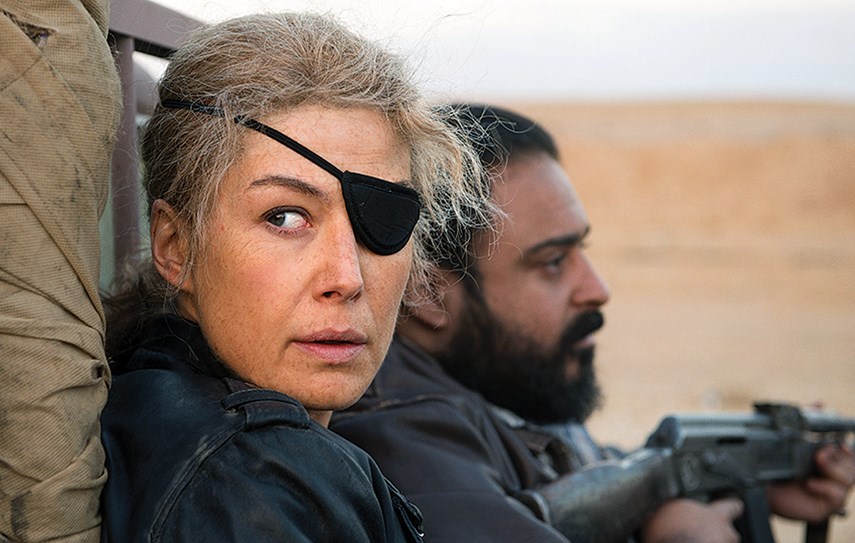A Private War. Directed by Matthew Heineman. Starring Rosamund Pike. Rating: 8 (out of 10)
In an age where journalists and journalism is under attack from all sides, when “fake news” abounds and we are spoon-fed our facts on 24-hour networks, A Private War serves as a potent reminder of the effort expended by correspondents to illuminate, inform and bear witness to man-made catastrophes.
We take it for granted, that footage of the horrors and wonders of the outside world that lights up our computer and television screens, only to be swiped, scrolled or channel-changed away after brief consideration.
War correspondent Marie Colvin was one such crusader, jumping from one conflict to another at great personal risk to her health and emotional stability. Rosamund Pike gives the performance of her career playing Colvin. It’s a world away from the sweet sister she played in Sense and Sensibility, and the natural progression of such varied roles as An Education, A United Kingdom, Gone Girl and her Oscar-worthy turn in last-year’s Hostiles. Stripped of any glamour, the actor nails Colvin’s appearance and accent, transformed into the woman who gave her life in the pursuit of personal stories that would bolster the truth.
The story begins in Homs, Syria, and flashes back to war-torn locales that will eventually lead us back there. Colvin loses an eye covering the Tamil Tigers in Sri Lanka and then, after picking up a Foreign Correspondent of the Year award but barely recovered, she begs her Sunday Times editor (Tom Hollander) to let her go back on assignment. “I’m not hanging up my flak jacket,” she assures him.
Next she finds herself on the Iraqi border, where she recruits freelance photographer Paul Conroy (Jamie Dornan), despite never having seen his work. They brave Iraqi security forces and IEDs and hire a bulldozer to expose a mass grave in the desert near Baghdad. There’s Afghanistan. Then there’s Libya, where she investigates the rape of 1,000 women (“maybe more”) who were attacked by soldiers as punishment for the uprising.
The conflicts and the corpses begin to meld together, and that’s the point. While the governments and landscapes may differ, our humanity is the same; it doesn’t matter if it’s an Iraqi child or a Bosnian child lying lifeless on an operating table: there’s equality in that kind of tragic loss.
Colvin is not immune to the human suffering she covers: her reporting on the mass graves in Iraq and “the fragility of the human body” is set against her continual and heavy drinking, her raging against nightmares and memories. Relationships – including two marriages and divorces to the same man – are difficult to maintain with war-zones calling. (Stanley Tucci plays her last love.) The stress and the drinking make Colvin lose several teeth, and she is hospitalized for PTSD before racing headlong into the next conflict.
The film was written by Arash Amel based on Marie Brennan’s Vanity Fair article of the same name and directed by acclaimed documentary filmmaker Matthew Heineman (Cartel Land, City of Ghosts). It was produced by Charlize Theron, with an original song by Annie Lennox, whom Colvin had met a year before her death.
“You have a God-give talent to make people stop and care,” says her editor, clearly torn between a gripping story and the recklessness of his reporter. Because, as Colvin herself once said: “There are old journalists and there are bold journalists, but there are no old, bold journalists.” The film doesn’t shy away from the fact that Colvin’s brazen decisions put the lives of others in harm’s way, but by the then the risk is seen as a necessary evil undertaken by a brave few.



